What’s so great about the Mediterranean Diet? Well, lots! I recently visited with Kelly LeBlanc, a registered dietician and director of nutrition for Oldways, a food and nutrition nonprofit. She walks us through why the Mediterranean Diet ranks as the top healthy diet to follow year after year, is recommended by doctors, and how to make it work for you!
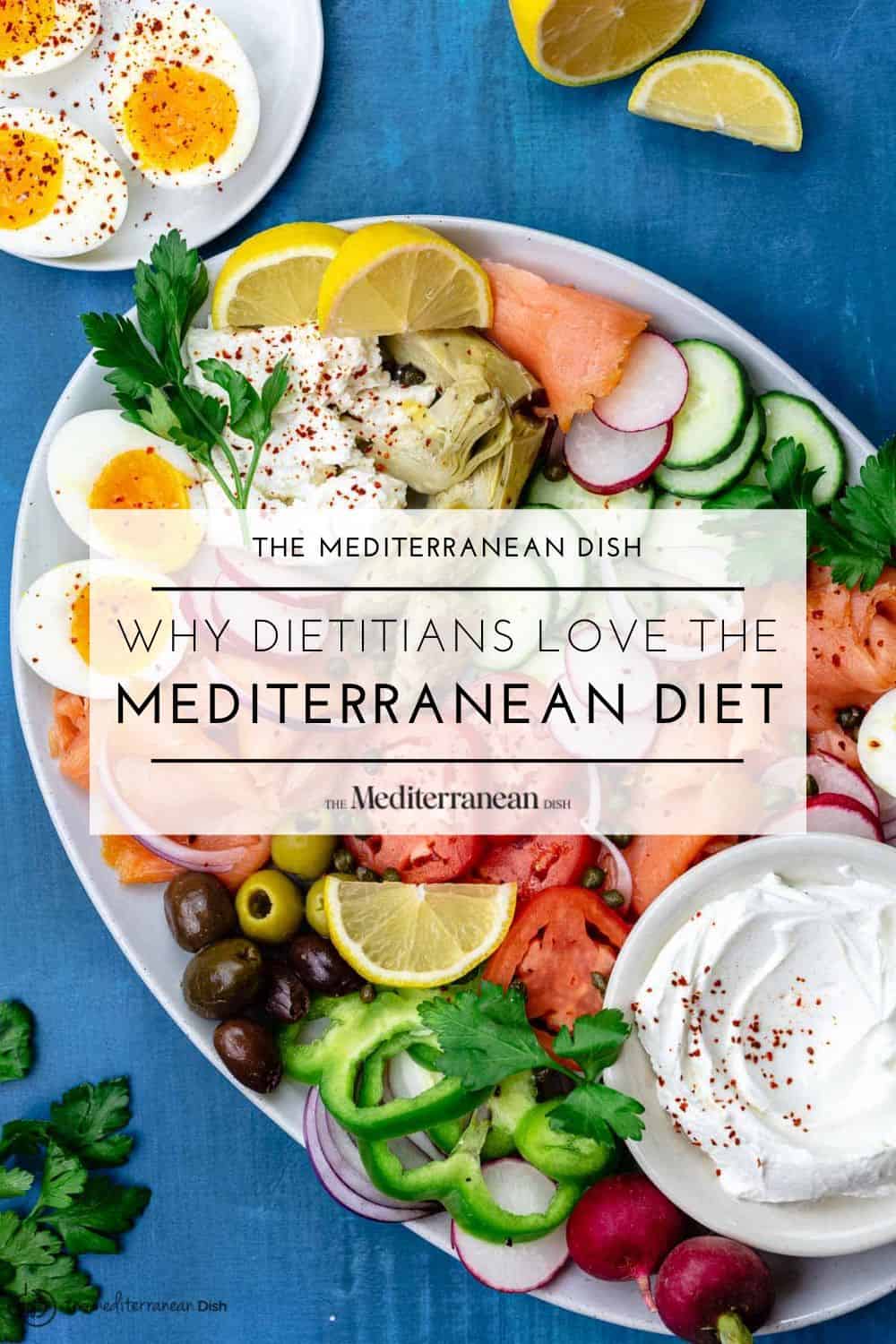
At The Mediterranean Dish we know why we love food from the Mediterranean. It’s affordable, easy to make, bursting with flavor, and its good for our bodies and brains. Every year new people visit our site (welcome!) because their doctor recommends they follow the Mediterranean diet and its lifestyle.
“Research has consistently shown that the Mediterranean diet reduces the risk of cardiovascular disease … for those who follow it,” according to the Harvard School of Public Health. Doctors not only recommend The Mediterranean diet to help keep your heart healthy, but also to reduce Type 2 Diabetes, and support and maintain healthy weight loss.
To better understand why a doctor might recommend this way of eating, I spoke, with Kelly LaBlanc, an expert on food, nutrition, and cultural foodways. Kelly has been with Oldways, a food and nutrition nonprofit, since 2014. In addition to having a Bachelor of Science in nutrition, she also holds a Master’s degree in gastronomy with a concentration in food policy. As part of her education, she spent time in Sicily with a specific focus on the Mediterranean diet.
Through our conversation, she provided a little insight into what to eat on the Mediterranean diet, and why once you start eating this way you’ll probably never stop!
For some meal-time inspiration check out our favorite Mediterranean Diet recipes. And if you need a shopping list, well, we have you covered there too.
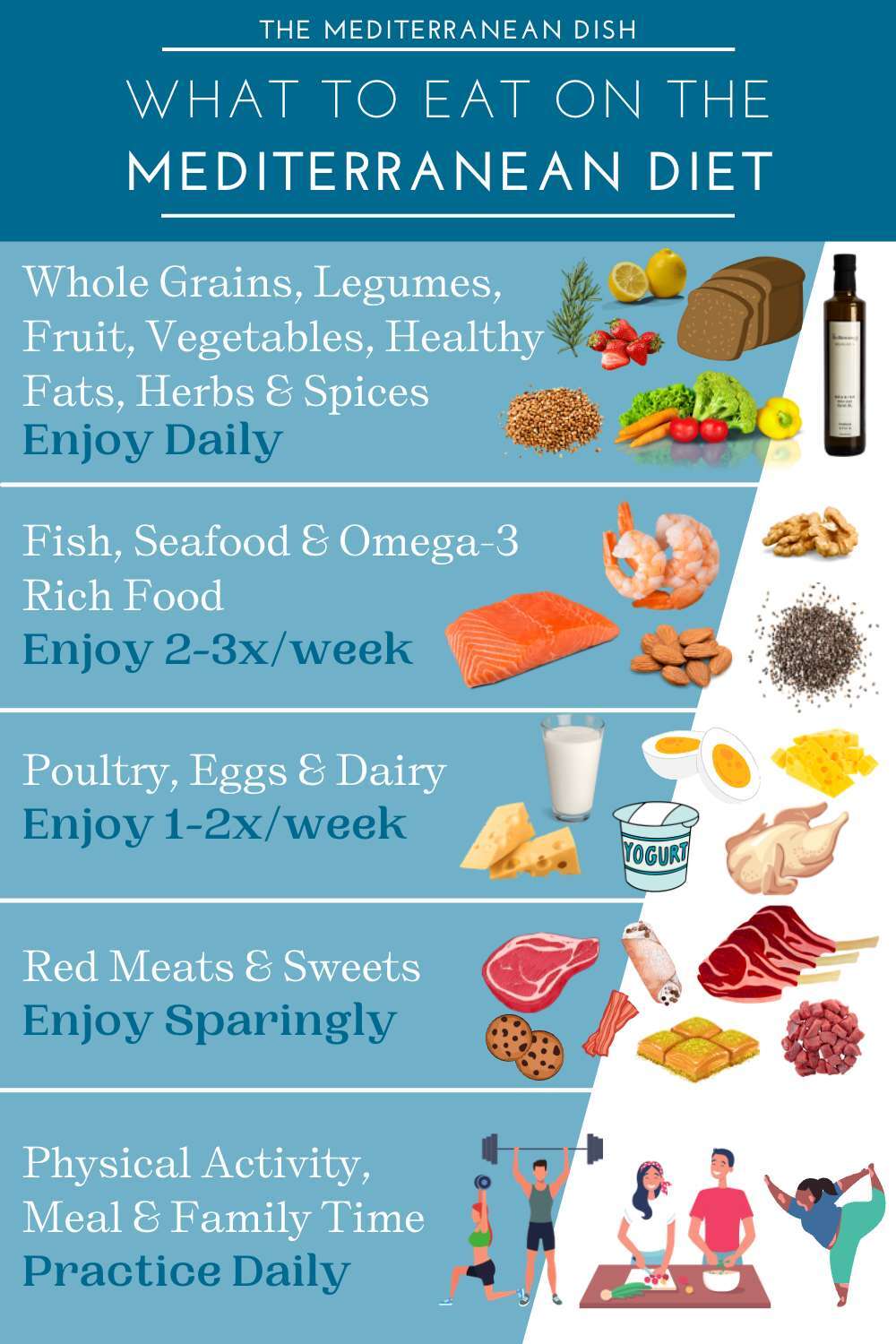
Q: What is the Mediterranean diet?
A: Generally speaking, the Mediterranean diet is based on traditional foods and foodways from countries surrounding the Mediterranean Sea.
Going back centuries in time, people around the Mediterranean enjoyed a diet of whole grains, legumes, seafood, seasonal fruits and vegetables, and olive oil. Back then, eating seasonally from local gardens, using lots of plant-based protein sources, and whole grains was considered “peasant food,” but today, we understand the inherent wisdom in these traditional eating patterns.
What are a few swaps that someone switching from the standard American diet to the Mediterranean diet could make?
When starting on the Mediterranean diet, begin with simple swaps.
- Week 1: Buy olive oil and start using it as your primary cooking oil. Do this to replace butter, lard, coconut oil, or other oils.
- Week 2: Incorporate 1 or 2 seafood-based meals, and/or 1 or 2 meatless meals.
- Week 3: Stock up on hummus and veggies for snacks, as well as fresh or dried fruit.
- Week 4: Swap a sugary dessert with a small piece of traditionally produced cheese, such as Parmigiano-Reggiano or Pecorino Romano. Add a handful of dried apricots, figs, or cherries to end your meal, or finish with a fruit salad. Depending upon the season try winter fruit salad or summer fruit salad.
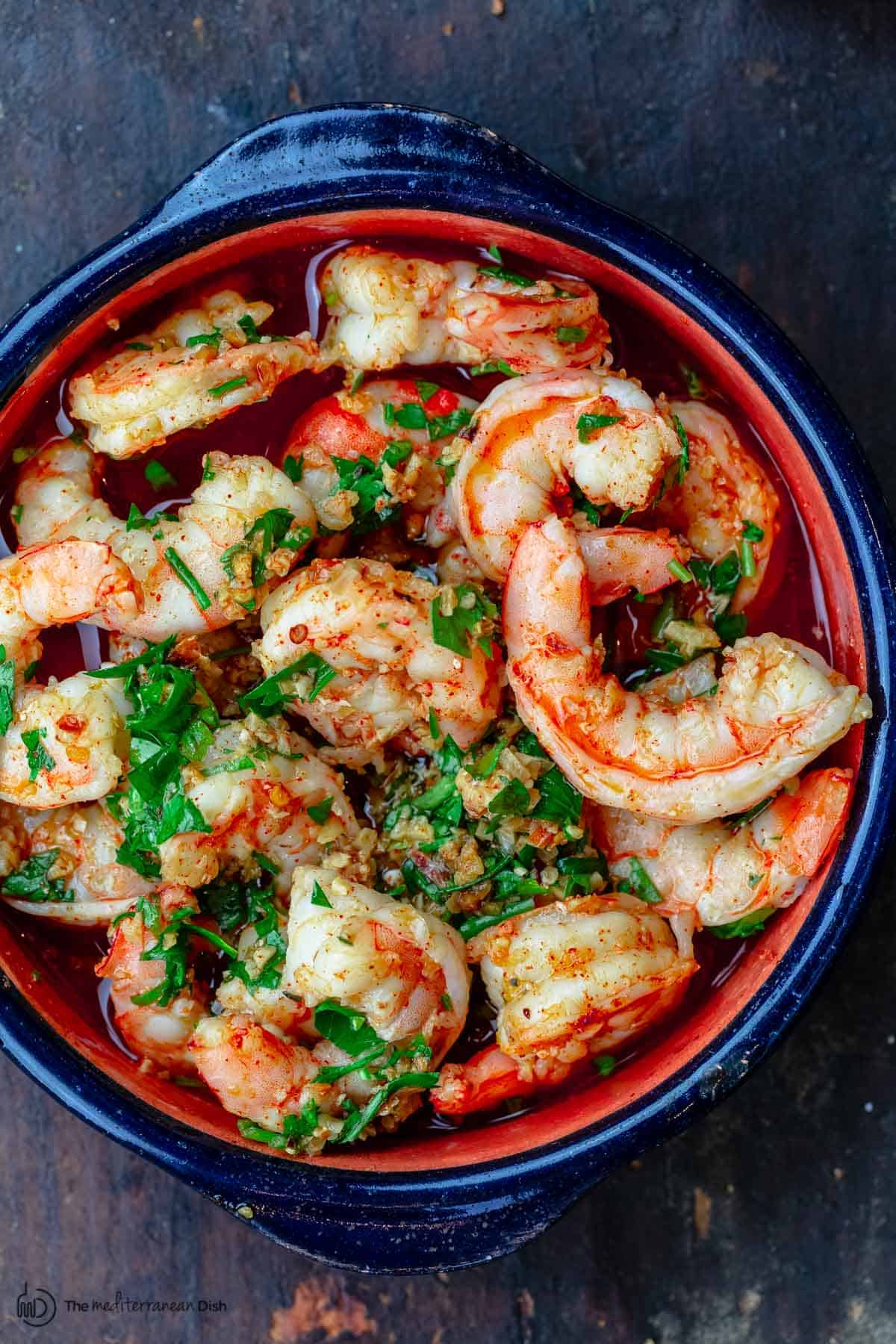
Q: From your experience and expertise as a dietician, what do you like about the Mediterranean Diet? Why is it beneficial for people?
A: Mediterranean recipes are so flavorful that it is easy to follow this delicious dietary pattern long-term. It’s easier to embrace the Mediterranean lifestyle once you’ve shifted the focus from a mindset of restriction to a mindset of flavor, community, and abundance.
The best thing about eating the Mediterranean way is the focus on flavor and the pleasures of the table. While many “diets” in the common sense of the word are rooted in deprivation, the Mediterranean diet is a joyful way of eating that celebrates foods and their histories. Good food, good wine, good company… who wouldn’t love that!
Q: Why do doctors frequently recommend the Mediterranean diet?
A: For over half a century, scientists have been documenting both the long-term and short-term health benefits of following a Mediterranean diet.
Landmark randomized studies have found that people who follow a Mediterranean diet have a 30 percent lower risk of heart disease. Subsequent studies have shown the Mediterranean diet’s impact on chronic disease prevention, healthy aging, healthy pregnancies, brain health, and more.
Studies show that people who adopt a Mediterranean diet have a significantly lower risk of heart disease and many other health conditions. Even family members of people who adopt a Mediterranean diet benefit from a “halo effect”. This is due to their families’ healthy habits rubbing off on them.
This type of eating is also budget-friendly, as beans, legumes, pasta, and seasonal produce are all affordable ingredients.
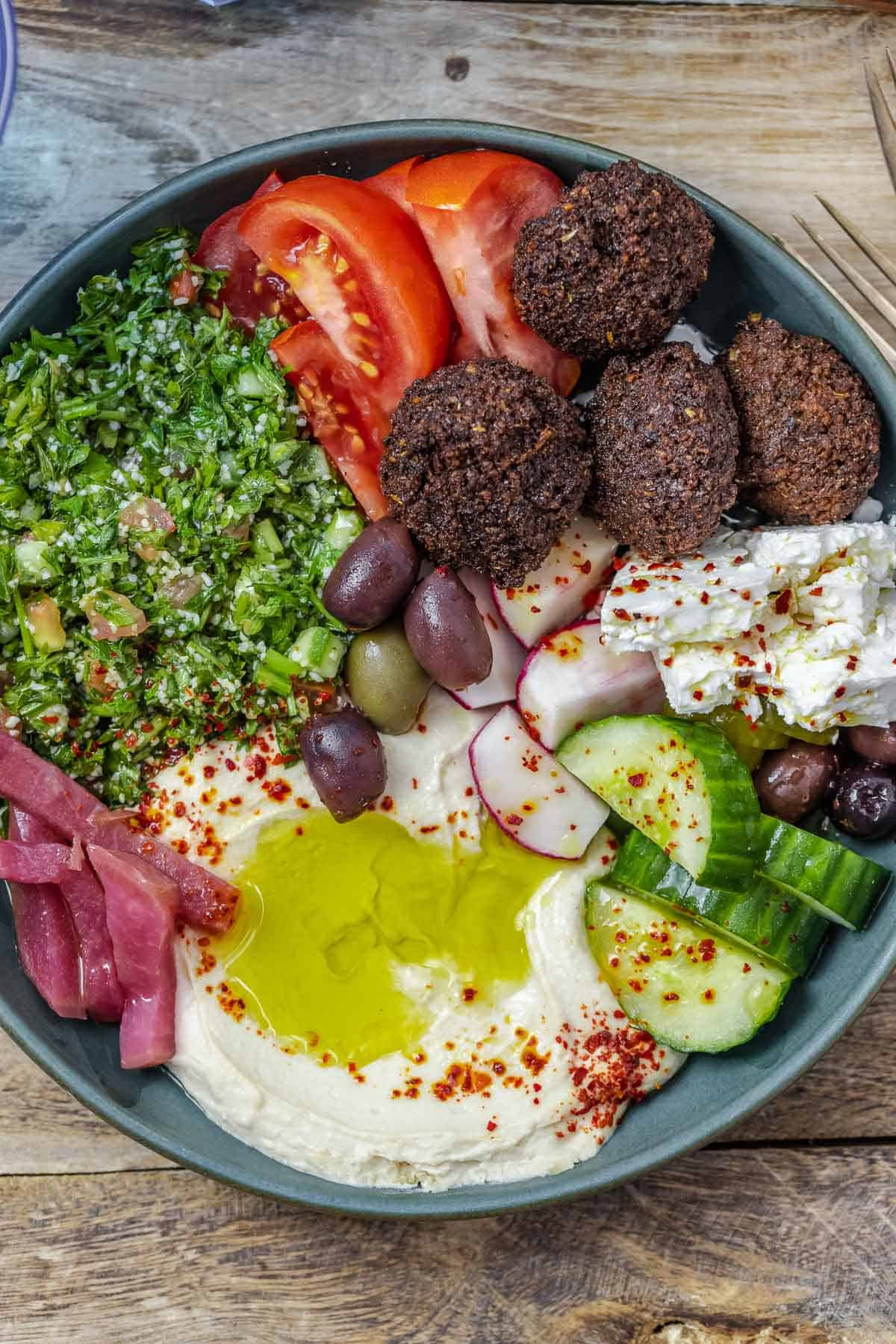
Q: Tell me about the vast cuisines of the Mediterranean.
A: The Mediterranean diet as we know it today represents the broader pattern of eating found throughout the Mediterranean region.
This includes Cyprus, Spain, Greece, Italy, Portugal, Turkey, Israel, Lebanon, Egypt and more North African countries. Today, approximately 27 countries surround the Mediterranean Sea, with similar climates and foods.
In Southern Europe, the cuisine is centered around the “Mediterranean Trinity” of olives, wheat, and grapes. They are used to make olive oil, bread, and wine. Some typical dishes include pesto, pasta, lentil soup, paella, bouillabaisse, salade niçoise, and minestrone soup.”
In the Eastern Mediterranean, ingredients reflect the region’s Levantine and Ottoman influences. Sour flavors like sumac, pomegranate, lemon juice, and bitter orange dominate the Eastern Mediterranean cooking palate. Some typical dishes include hummus, baba ganoush, falafel, tabbouleh, dolma, and many different types of salads.
In North Africa, cuisine is shaped primarily by the Berbers and Egyptians, with some Spanish and Portuguese influences as well as influences from other Arab nations. Key foods and dishes include couscous, tagines, dates, olive oil, and lots of spices.
While each of these regions has its signature dishes, they are based on similar food patterns. All include legumes, vegetables, fruits, whole grains, olive oil, nuts, herbs, spices, and fish. We encourage people to explore the diverse selection of foods and flavors the region has to offer!”
Kelly LeBlanc, MLA, RD, LDN is an expert in food, nutrition and cultural intersections of food and culture. She serves as the Director of Nutrition for Oldways, a food and nutrition nonprofit dedicated to helping people live healthier lives through cultural food traditions. Readers assume full responsibility for consulting a qualified health professional regarding health conditions or concerns before starting a health program, new way of eating, or diet.
This interview has been edited for length and clarity.
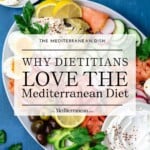

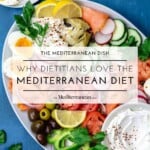
I love the dishes, but am concerned about the fat and carb content. Is that not a health issue for most people? Thank you.
Hi, Pat! I’m Summer and I work here at The Mediterranean Dish. The Mediterranean Diet does use a lot plant-based proteins like beans and pulses, which are higher in carbs but also very high in fiber. Olive oil is high in fat, but it’s the good kind and has lots of beneficial polyphenols. You can always reduce the amount of olive used and double the vegetables. However, we also have many low-carb options like Crustless Quiche, Whole Roasted Chicken, Greek Shrimp with Tomatoes and Feta and any number of salads. Take some time and explore, hopefully you’ll find something you like and let us know if you have any questions. We are always here to help.
Can diabetics do the Mediterranean diet?
Hi, Marie. Yes, the Mediterranean Diet is generally considered safe and beneficial for people with diabetes. However, when considering following a new way of eating, we always highly recommend consulting with a doctor or registered dietitian first… someone familiar with your medical history. We are not medical professionals here, so they would better be able to advise you on which specific foods/recipes are safe for you to eat.
Hello,
I have a question about how often you should eat certain types of food. When it says:
Fish and seafood dinners- 2 to 3 times per week
Does that include all meals? For example, if you eat fish for lunch one day, do you count that toward the total?
I am trying to put together a grid to track for poultry, fish, meatless, nuts, beans, etc. for all meals.
Thanks so much!
Hi, Julie! When it comes to seafood, you generally want to aim for 2-3 servings per week. Try not to get too caught up in the details. Remember, eating the Mediterranean way is not a diet in the restrictive sense with a strict list of “dos” and “don’ts.” It’s more of a food philosophy focused on wholesome & nutritious ingredients, bold flavors, celebration, and hospitality. It’s also about making healthier choices that honor your body and allow you to enjoy the long-term benefits of an active lifestyle.
Looking for better health
My doctor suggested the Mediterranean diet!
Hi, I have been researching the healthiest meal plan for my husband with high cholesterol. Reading the nutritional data, I am seeing recipes with high cholesterol content. Would that be due to the olive oil amounts used throughout the recipe itself? I asked because, GP says use Pam, cardiologist says canola or olive oils. I do prefer olive oil when cooking? GP says I have been cooking heart friendly, however, not waist friendly for my husband. Any suggestions would be quite helpful. I did make to watermelon tomato salad with our supper last night. Delicious, this morning, I realized I had forgot the dressing. 🤦🏻♀️
Thank you very much for the wealth of information and delicious recipes that I can’t wait to get started on. You make it look straight forward and yummy.
Just found the The Mediterranean Dish, what wonderful recipes, just had my first dish, eggs on toast with vegatable, it was amazing. Having Grrek fish and Onions on Sunday. I’m definately enthused and converted, your videos are good too, really help.. Thanks.
Thanks, Chris! Welcome to The Mediterranean Dish!
Looking forward to exploring these recipes.
Hope you find a lot you enjoy!!
Are there any FAST FOOD Medditerrean options?
Hi, Chloe. I think this really depends on where you live, so I’d do an internet search to see what might be around you. We have some locally here in Georgia, so I know they do exist :).
I’ve been wanting to start this way of dieting for a long time .
Looking forward to recipes &anything about the Mediterranean way of living.
I need recipes for healthy meals that are easy to prepare and taste delicious! I want to eat real food, not the unpronounceable chemicals found in most food products now.
You’ll find so many recipes here that fit those qualifications! Can’t wait to hear what you try!
I am looking forward to learn a lot more about the Mediterranean dishes
Awesome! Welcome to The Mediterranean Dish, Brian!